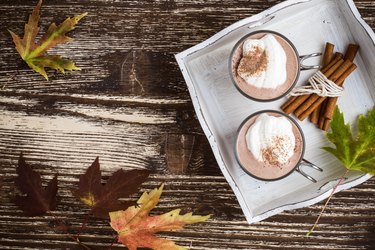
If you sprinkle a bit of cinnamon on your oatmeal every morning because you've heard it's good for you, you're not alone. Cinnamon flavoring spice and cinnamon extract have long been valued for its anti-inflammatory, antimicrobial, antibacterial, anti-fungal and anti-clotting properties.
All natural cinnamon products, including cinnamon extract and ground cinnamon — the red-brown spice with the sweet-hot flavor that's instantly recognizable — are made from cinnamon bark, which contains beneficial and highly potent essential oils.
Video of the Day
Video of the Day
Read more: Is Too Much Cinnamon Bad for You?
Understand Ground Cinnamon
Ground cinnamon is made by pulverizing cinnamon bark into tiny, powder-like particles. Most of the ground cinnamon used in American kitchens is cassia cinnamon, which is distinguished by its deep red-brown color and strong, peppery flavor. Because cassia cinnamon bark curls tightly inward from both sides as it dries, it's generally too hard to pulverize at home, even in a spice grinder.
Although Ceylon cinnamon, also known as true cinnamon, isn't the predominant kind in the United States, it's becoming more readily available. Ground Ceylon cinnamon is lighter in color and sweeter tasting than the cassia variety. The bark itself is also thinner and softer, making it relatively easy to grind at home.
Compare with Cinnamon Extract
Cinnamon extract, or liquid cinnamon, is a more concentrated source of flavor than ground cinnamon. Much like vanilla extract, it's made by soaking cinnamon bark in alcohol and then straining out any remaining solids.
Although manufacturers aren't required to list the kind of cinnamon used in their products, most of the commercially produced extracts in the United States come from cassia cinnamon, according to the National Center for Complementary and Integrative Health.
Cinnamon extract has a long shelf life when it's stored in a cool, dry place, but like ground cinnamon, it loses potency over time. Cinnamon extract shouldn't be confused with cinnamon oil, which is obtained directly from the bark and is a far more concentrated source of flavor.
Know the Potential Benefits
According to an October 2012 study published by Clinical Nutrition, research has shown that cinnamon can lower blood sugar levels, possibly by slowing the movement of food from the stomach to the small intestine.
However, the majority of the research reviewed by the authors did not demonstrate significant blood sugar control by cinnamon supplementation for individuals with type 2 diabetes. More research is needed in this area.
According to a 2014 article published by Evidence-Based Complementary and Alternative Medicine, cinnamon is used all over the world for its purported health benefits. Liquid cinnamon and ground cinnamon nutrition include antimicrobial, antibacterial, antiinflammatory and antioxidant components.
Cinnamon is also being studied for potential use in the treatment of cancer and neurological conditions such as Alzheimer's and Parkinson's diseases.
Beware Potential Health Risks
While sprinkling some ground cinnamon on your oatmeal or stirring a teaspoon of cinnamon extract into a bowl of oatmeal will most likely benefit your health, consuming too much cinnamon could impose health risks.
Cassia cinnamon contains coumarin, a compound that is toxic in high doses and can cause liver damage, according to a June 2015 article published by Pharmacognosy Research. Coumarin is also an anticoagulant, which means that eating large amounts of cassia cinnamon could potentially inhibit your blood's ability to clot when necessary — particularly for those already taking anticoagulant medications such as Warfarin.
If you're interested in consuming cinnamon for its potential health benefits, ask your physician which kind to use and how much you can safely consume.
- National Center for Complementary and Integrative Health: "Cinnamon"
- Clinical Nutrition: "Cinnamon in Glycaemic Control: Systematic Review and Meta Analysis"
- Evidence-Based Complementary and Alternative Medicine: "Cinnamon: A Multifaceted Medicinal Plant"
- Pharmacognosy Research: "Cinnamon: Mystic Powers of a Minute Ingredient"